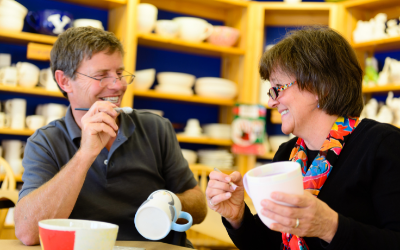What on earth is social prescribing I hear you ask? And sadly, you are not alone if you have not come across the concept yet.
I say “yet” because social prescribing is something we at Space2BHeard wholeheartedly advocate.
And we are doing all we can to spread the word, and to enable our community to see the huge benefits of this non-clinical alternative for mental health and wellbeing.
This article explains the meaning and benefits of social prescribing, signposts you to local resources, and gives an example of our own community’s success in the words of one of our service users.
What is Social Prescribing?
Put quite simply, it is a free-of-charge ‘social’ prescription, where medication, and even more so repeat medication, might not be the most appropriate solution.
GPs, Practice Nurses, Midwives, and other health professionals offer social prescribing as a way of referring their community to a variety of local services, events, and resources.
Surprisingly, it is something that started in various guises in smaller inner and outer London areas way back in the ’90s. But social prescribing, also sometimes known as community referral, has yet to reach its full potential in many other areas, such as Hull and the East Riding.
Social prescribing offers an alternative to traditional medicine. It encourages the ‘patient’ to take more control of their own care and health. And studies have shown that people treated through social prescribing start to feel better and get better quicker than with prescribed medication alone, if at all.
As an organisation offering an holistic approach to mental health and wellbeing, Space2BHeard is supporting it as much as possible, and would love you to discover the benefits, too.

The range of resources and activities includes local community clubs and societies where the users can participate in physical activities, social events, improve skills in CV writing, volunteering in the community, befriending, arts and crafts, cooking, healthy eating advice, and more practical support and information about housing, finances, and family resources.
More to come later in this article around the specific social prescribing resources in our area.
What Are the Benefits of Social Prescribing and Community Referral?
Whilst studies into the operating models around social prescribing are still relatively small, and there is no set structure for implementation from one region to the next, the following have been seen in various focus groups, community reports, and GP practices:
- Reduced pressure generally on the NHS.
- Reduction in in-patient, out-patient, A & E use (specific Rotherham study).
- Allows individuals more choice and control over their lives, health, and care.
- Improved self-awareness, anxiety levels, and general health and wellbeing (Bristol).
- Increased community support and fewer isolated individuals now attending relevant chosen social events and activity hubs (various sources).
- Improvement in health-related quality of life (Bradford).
A recent University of Westminster summary, based on evidence of support through social prescribing, reflects an average 28% reduction in GP consultations and 24% less in A&E attendances.
Specific reports aside, from an overall perspective, the emotional and mental health and wellbeing outcomes recorded across community referral users, have been positive.
The work carried out by volunteers, link workers (those responsible for signposting individuals to the local support and resources), and voluntary and community sector organisations is integral to the effective roll-out of social prescribing across all areas of the country.
So, it is great to be able to share the 2019 NHS Long-Term Plan, “that by 2023/24 every GP practice in England will have access to a social prescribing link worker and 900,000 people will be referred by then.”
When is it Appropriate to Consider Social Prescribing?
Statistics show that at least one-third of the population visits their GP. Some more than others. And records reveal that these visits are not always in relation to issues that can be treated medically or with medical referrals.
In fact, according to King’s Fund, an independent charity focusing on health and care in England: “people’s health and wellbeing are determined mostly by a range of social, economic and environmental factors.” This could be anything from underlying concerns around employment, housing, relationships, debt, and isolation or loneliness, for instance.
If, from the patient’s records, it is apparent or becomes clear that their problems are more lifestyle-related, or can be approached and potentially treated with this alternative, then they will be signposted to relevant local activities, groups, or resources to seek advice.
The position we are hoping to reach is that whereby patients who genuinely do not need to see their GP, are not making such appointments. But they are already aware of the social prescribing route and can head in that direction instead.
How Space2BHeard is Supporting Social Prescribing
Of course, we are a small not-for-profit organisation, and rely on the support and goodwill of people such as you, in our local community, to guide and inform others of the resources we offer.
In many cases, people do not know what is available by way of community-centred support until they attend an appointment with their GP, and they are signposted from there.
Some GPs may have a social prescriber attached to the practice, but you do not need to wait for a referral from your GP, or social prescriber. You can self-refer to a link worker or seek the local resources directly.
Here at Space2BHeard, at the end of a client’s treatment, we signpost to all local social prescribing opportunities that we think will be of benefit, helping in their journey of recovery and maintaining their wellbeing.
We provide the ‘Connect Well Hull’ details as the main point of contact for guidance and resources in the local area, which include an amazing selection of organisations and opportunities:
- Fitmums & Friends – new mums, older mums, grandparents, and siblings all come together for walking, running, athletics, buggy sessions, and Nordic Walking (this involves the use of walking poles so even the most physically imbalanced can join in!) Exercise is so much more fun when it involves socialising too!
- CallER Collective – the Hey Smile Foundation’s volunteer befriender scheme to support socially isolated residents. This scheme was a crucial life-line and great example of social prescribing, during the pandemic, possibly at the most important time for many of the people who have benefited from its service. And long may it continue!
- Andy’s Man Club – originally set up to break down the stigma of men keeping their problems to themselves, and in response to the sad suicide of a 23-year-old dad. The aim was to encourage men who were struggling with mental health issues to talk, but now they simply want to get men to talk through their challenges or “storms” as the website refers to them.
- CatZero – a Humber-wide non-profit organisation ‘delivering lasting personal change’ and providing mentorship and confidence-building opportunities for the under-privileged children of the region, including those looking to become economically active and seek permanent employment (see Vicky’s testimonial below).
As you can see, there is so much available, even within just these examples. The most wonderful stories and outcomes are achieved from social prescribing, as highlighted in this quote from Vicky, one of our Space2BHeard social prescribing service users:
“Over the years I have tried different local social prescribing options and recently I have participated in two local projects that have both been fantastic! Yoga on Prescription with Ali was a funded 10-week yoga course. By the end of it, I felt better in my body and also learned breathing techniques that help me feel calmer and get to sleep easier. I also met a great group of like-minded people.More recently I joined a group called Delivering Lasting Personal Change, it’s a 16-week programme where we do all sorts. Such as pottery painting, kayaking, walking with llamas as well as job search and support in getting back into the workplace. I have had real fun challenging myself and having a laugh. My confidence has increased, and I have learned new skills along the way.”

How to Find Out More About Social Prescribing
There are various places you can find more information on the subject, such as subscribing to the NHS England Social Prescribing online learning platform and The King’s Fund website.
Here at Space2BHeard, we will continue to support social prescribing as one of our additional services, and would love to hear about how you have benefited from it in your local community. In the meantime, if you’d like further information, contact the business support team on 01482 705023 or email hello@s2bh.org
We would highlight that if you suffer from clinical depression, or complex mental health issues, social prescribing may help, but you should seek medical advice, and continue with any prescribed medication or other medical intervention, rather than try to manage your symptoms alone.


